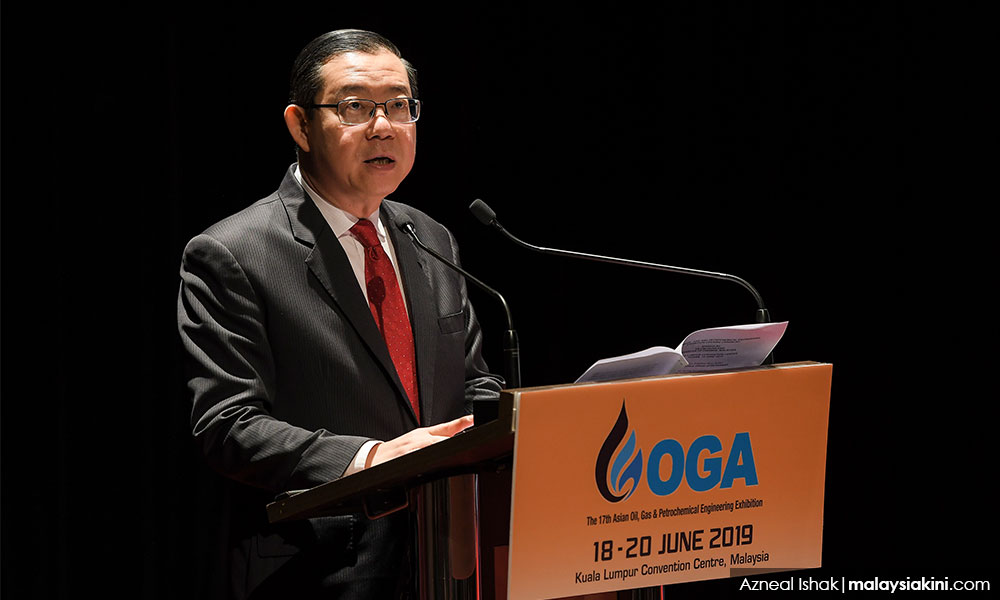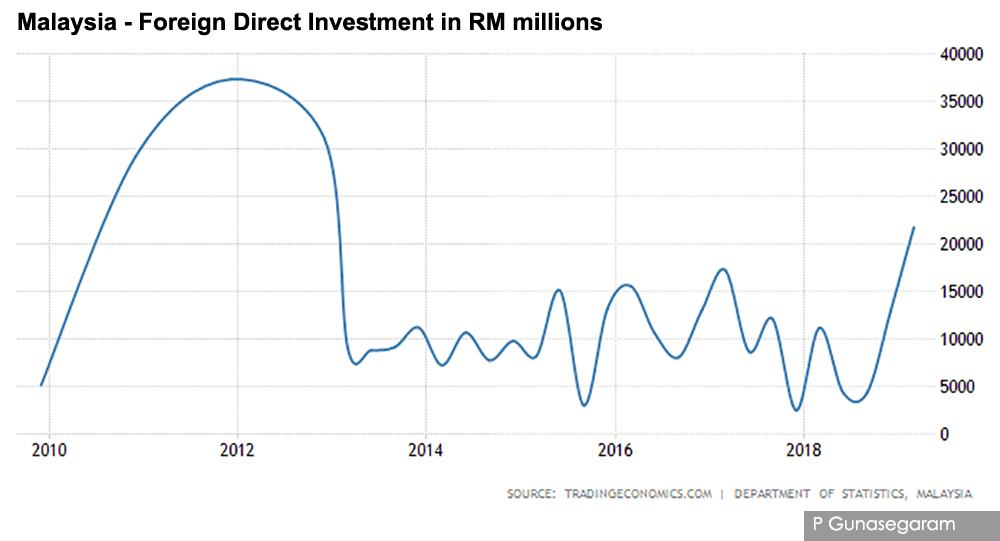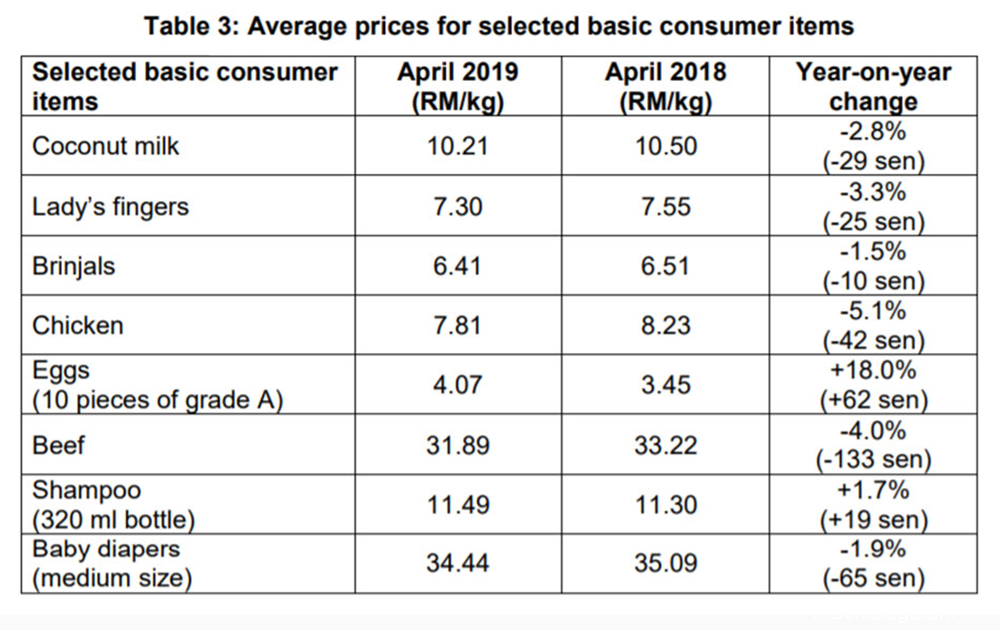
QUESTION TIME | Is it right for Lim Guan Eng (photo, above) to take credit for the new government for the sharp increase in foreign direct investments and the reduction in prices of goods? Is it true the government is turning around confidence in the economy and is capping prices through the elimination of the goods and services tax?
In effect, the sharp rise in FDI actually masked a sharp drop in domestic investments, which Lim failed to address and explain satisfactorily in his statement.
It also shows the government’s tendency to highlight positives and hide the negatives not good for a government that espouses transparency, accountability and integrity. Further, there is a claim to inflation control, which is not warranted. Let’s explain.
Lim quoted Malaysian Industrial Development Authority (Mida) figures to say that “in the first quarter of 2019, approved foreign direct investment (FDI) for all sectors soared 73.4 percent to RM29.3 billion, from RM16.9 billion a year ago.
“The 73.4 percent 2019 first quarter rise in overall approved FDI was driven by a 127 percent manufacturing investment surge to RM20.2 billion, compared to RM8.9 billion a year ago.
"Out of the RM20.2 billion in approved manufacturing FDI, RM11.5 billion came from the United States, RM4.4 billion from China and RM2.2 billion from Singapore.”
This was preceded by a paragraph which attributes the FDI performance partly to the government: “With a competent government at the helm, Malaysia is capitalising on its competitiveness within the global supply chain to become one of the top preferred safe havens in the region. Malaysia is reaping benefits from business relocation, as well as trade and investment diversions caused by the trade war between China and the United States.”
Not all of that is true. FDI negotiations are typically long, very complicated and involve a lot of back and forth between the foreign investors and Malaysian authorities.
Mida, under the Ministry of International Trade and Industry, has for decades acted as the coordinating body for this, liaising with various other government units in the Finance Ministry and Bank Negara Malaysia, among others. It has generally done a good job under different prime ministers.
When the first quarter of 2019 started, the new government had barely been in power for a mere six months and it is hard to believe that Lim and his cabinet colleagues had any major input into the inflow of investments - they were attending to too many other things. More likely, Mida had been working on these for years and is only now reaping the fruits of its earlier labour.
Also, Lim should know that a few large investments coming in from outside the country can skew the figures considerably. Surely the efficiency of the government was not instrumental in a 127 percent rise in manufacturing investments. It would be useful if the government disclosed figures for large investments.
The chart of foreign direct investments, since 2010 on a quarterly basis, clearly shows that investments are extremely lumpy and can vary considerably from quarter to quarter. It will be difficult to even establish a trend, let alone explain a sudden rise in a particular quarter. Lim should be more circumspect about claiming credit when credit cannot be established.

Further, while Lim has been quick to claim the credit for the increase in FDI, Mida figuresshow that the total approved investments, which include domestic investments, went up just 3.1 percent in the first quarter of 2019 to RM53.9 billion, compared with RM52.3 billion in the previous quarter.
Deduction of the FDI from the total investments shows that domestic investment in the first quarter dropped 30 percent to RM24.6 billion (53.9-29.3) from RM35.4 billion (52.3-16.9). This was not explicitly disclosed anywhere.
Can we then look at the decline in domestic investments and say that the government has done badly? No! In the same way that the government can’t take credit for the rise in foreign investments.
If Lim wants to take credit for the rise in approvals for FDI, then he has to tell us what the government has done to make the investment climate so much better that foreign investors are flocking to this country.
The other thing to remember in these statistics is that these are approved investments, not actual investments which matter far more. Many approved investments never take off and it will be interesting if the government provided figures for actual investments alongside approvals. This will give a good feel for how much of approved investments are eventually translated into actual investments.

On inflation, Lim said: “Prices of some basic consumer items have fallen due to multiple factors, including the shift in the taxation regime from the burdensome goods and services tax (GST) to sales and service tax (SST), and the imposition of price ceilings on RON95 and diesel. In February 2019, the price ceiling of RON95 was reduced from RM2.20/litre to RM2.08/litre. For instance, the average price of lady’s fingers in April 2019 was RM7.30/kg, which was 25 sen lower than it was a year ago at RM7.55/kg in April 2018. Average price of beef was RM31.89/kg, 133 sen cheaper than it was a year ago.”
He also provided a table (Table 3). However, almost all the items in the table were previously exempt from GST and therefore the removal of that tax would have had no impact whatsoever on the prices. What was it the government did to reduce prices here?
It’s fine for the government to claim credit when it genuinely deserves it, but it should not opportunistically claim credit when other factors, besides its performance, improve the fickle economy. To do so brings disrepute to the government and erodes trust.
Lim must remember that and play less the game of political upmanship against the previous government. Ultimately, you can’t lie about the economy.
P GUNASEGARAM likes this statement attributed to Benjamin Disraeli: “There are three kinds of lies: lies, damned lies and statistics.” E-mail: t.p.guna@gmail.com - Mkini



No comments:
Post a Comment
Note: Only a member of this blog may post a comment.